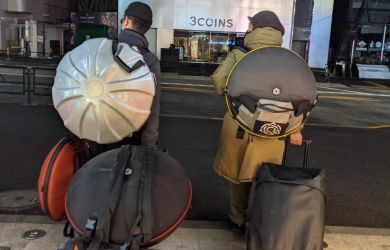
March 26, 2009
On the Road to Justice
A motorcyclist sets out to keep his family's killer behind bars
By Metropolis

Stucki holds a collection of newspaper clippings chronicling his mission
Suffering from insomnia, depression and posttraumatic stress disorder, Stucki cannot put his tragedy out of his mind.
“When I turn on the TV and watch the bad news—especially arson—it’s brutal,” he says. “When I see such news, everything begins again.”
His pain is compounded by a crippling life-long affliction. When he was just 6 months old, doctors in Rome diagnosed him with polio and told him he would never be able to walk. But after a series of operations, Stucki took his first steps at the age of 6. He still walks with a limp.
Stucki spent his childhood in Switzerland and Italy, growing up speaking three languages. Picked on because of his leg, he took up judo at the age of 11, switching to kendo when he was 15.
His martial arts took him from ippon to Nippon, where he continued his kendo studies and entered Doshisha University in Kyoto. After graduation, he taught Italian, German and English—and opera—in Miyazaki. He met his wife and founded a tile import business there.
A devout Catholic, Stucki says his mission is not a personal vendetta, but based on a strong desire to bring justice to other victims of heinous crimes in a country he feels is losing its way.

Stucki's surviving daughter, Miyuki, and granddaughter Yua Courtesy of Alberto Stucki
“Society has changed. When I came to Japan 33 years ago, people respected each other,” he says. “People have no respect now for their mother or father. Communication is getting colder. Families don’t love each other… It’s important to return to education as it was 35 or 40 years ago, from the standpoint of values. Not only must the criminal code be changed, but also the inside of homes.”
In his quest for the adoption new sentencing guidelines, Stucki has found unlikely allies in organizations that oppose the death penalty. A bipartisan group of about 140 lawmakers, headed by Shizuka Kamei of the center-right New People’s Party, is pushing for the death penalty to be replaced by a sentence of life in prison without parole. (Progress is slow—one Osaka anti-death penalty group refers to itself as the Katatsumuri-kai, or “Snails Association.”)
The public, however, feels differently. A 2005 government survey found that more than 80 percent of Japanese favored executions, with only 6 percent wanting the death penalty abolished. The Japan Federation of Bar Associations presents another obstacle. In November, the group issued a statement expressing opposition to a sentence of life without parole, arguing that although 79 lifers were released during the past ten years, another 120 died in prison—effectively constituting imprisonment for life.
Michael Fox, director of the Japan Death Penalty Information Center could not disagree more. “Even if public consciousness were to swing against the death penalty, the government, hardly interested in the views of the people, would probably hesitate at abolition,” he says.
Fox offers four barbed reasons why Japan retains capital punishment despite significant international pressure for reform. “Police leverage over criminal suspects: the death penalty allows police to threaten suspects in custody and coerce confessions. Psychodynamics: Japan is a demeritocracy. Social mobility and promotion occur for those who sacrifice without making mistakes. There is little positive reward, so sardonic psychological pleasures are received in the suffering of others. Social control: a fallacious belief that the death penalty keeps the masses in line. Tradition: killing as a punishment, like whaling, has a long cultural history, so why give it up?”
Public mood may shift, however, with the introduction of the so-called “lay jury” system in May. Under the rules, six men and women chosen at random will sit on juries in district court trials—including capital cases. No one can predict for sure how they will react when faced with having to play God.
Stucki realizes that to make a difference, he has to be sitting in a position of power rather than knocking at the door from outside. This has led him to apply for Japanese citizenship, something he needs to fulfill his ambition of running for office as a Diet lawmaker.

Stucki speaks before the press with Miyazaki Mayor Shigemitsu Tsumura
“I want to take responsibility for what I’m doing here. I need to be inside the government to do this—at least work for a minister,” he says. “I can’t change anything unless I meet everyone and tell everyone the same story. This would take me years.”
While Stucki is keeping to lawful channels in his quest to see Takeyama and other remorseless killers kept behind bars for life, his emotions get the better of him when he considers the prospect of the government one day freeing the man who murdered his family.
“Maybe he’ll be released in 15 years. This makes me mad. I can’t even touch him, otherwise I’ll go to prison for attempted murder. I know the government won’t let me, but I’d like to take him down the kendo dojo for just three minutes—just three or four minutes.”
Alberto Stucki can be contacted at minervai@rhythm.ocn.ne.jp.





